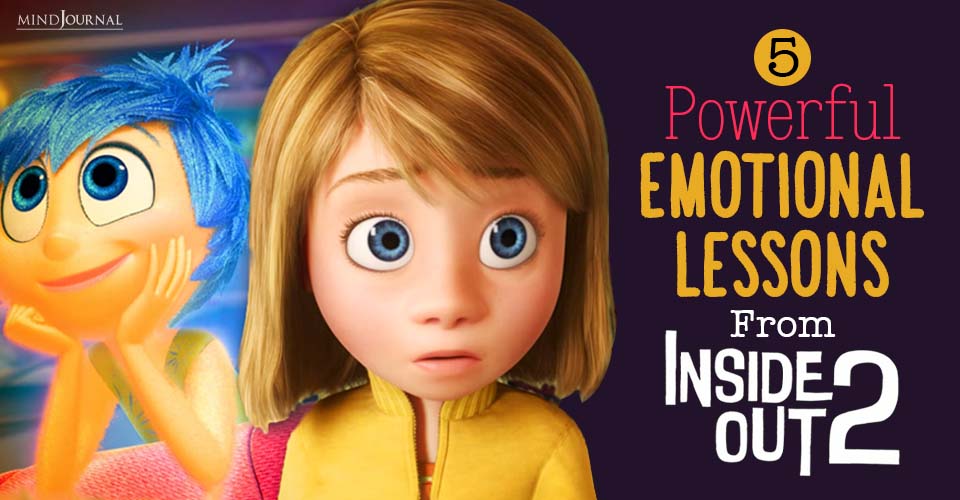Disney’s Pixar has captivated audiences once again with mental health lessons from Inside Out 2, a film that not only entertains but also provides insights into our emotional lives.
While Riley experiences puberty, new emotions in Inside Out 2 join our old friends Joy, Sadness, Anger, Disgust, and Fear. Anxiety, Envy, Embarrassment, and Ennui create different difficulties for Riley and the viewers.
Why ‘New’ Emotions Emerge in the Teen Years?
According to research one of the more difficult emotional changes in adolescence is feeling your feelings very intensely.
During puberty, changes in your body may lead to irritability, mood swings, and self-consciousness. Seeking identity from peers, uncertainty about adulthood, peer pressure, conflicting thoughts, mood swings, self-consciousness, and sexual feelings are typical experiences during this phase.
Related: Inside Out Zodiac Signs: Which Emotion Represents You The Best?
As Riley transitions from childhood to adolescence, she encounters a host of new emotions in Inside Out 2, these changes often reflect the complexity of growing up.
While Joy, Sadness, Anger, Disgust, and Fear were sufficient during her childhood, Riley’s evolving social dynamics, self-awareness, and pressures of fitting in necessitate the emergence of more nuanced emotions like Anxiety, Envy, Embarrassment, and Ennui.
5 Five Lessons to Learn from Inside Out 2

1. Avoid Toxic Positivity – Don’t Try to Force Happiness!
When Riley’s mom tells her to be their “happy girl” during their stressful move and her dad’s tough time at work, it brings up frustration.
This scene really got me thinking. Does this pressure to be happy actually help us cope with the challenges of life? I don’t think so. In Riley’s case, it seemed to make things worse. She felt like she had to bottle up her negative emotions, which isolated her and made her angrier. It even contributed to her decision to run away.
So what does work better for Riley and the rest of us? Studies suggest we should not only prioritize positivity but try to feel all emotions, including frustration and sadness But, that doesn’t mean you only are sad, you can also make time for activities or experiences genuine enjoy.
2. It’s Okay To Feel Sad!
Sadness plays an important role in processing loss, disappointment, and other difficult experiences. By teaching us how to feel and cope with sadness, “Inside Out 2” is teaching us how to live.
By allowing ourselves to feel sad, we can begin to heal and move forward. This is one of the important lessons from Inside Out movie and it teaches us to embrace our vulnerabilities and understand that sadness is a natural and normal phase in life.
3. Embrace Rather Than Suppress Tough Emotions
The movie stresses the need to consciously accept difficult feelings as opposed to repressing them. Shame and Jealousy, for example, are emotions that we usually find it hard to come to terms with.
Nonetheless, if we admit these sentiments and investigate their origins; we may understand ourselves better and what we want. Doing so mindfully also reduces our vulnerability towards such emotions thus promoting good control of our feelings on a healthy level.
4. Every Emotion Has a Purpose, Even the Bad Ones
“Inside Out 2” teaches us that each emotion, even the ones we consider bad, is there for a reason. Anger makes us aware of injustice and pushes us towards action. Similarly, fear keeps us safe by pointing out possible threats.
Although commonly thought of as negative, envy uncovers our real wants and goals in life. Knowing this makes it easier for people to deal with difficult situations they may face in their lives.
5. Not Being Okay Is Okay Sometimes
Perhaps one of the most comforting lessons from Inside Out 2 is that it’s perfectly fine not always to be okay.
Experiencing a range of emotions, including anxiety and sadness, is both normal and healthy. Teenagers must learn this, as they may be pressured to constantly appear happy and successful. Recognizing that it’s okay to have bad days is essential for our mental well-being.
3 Tips for Managing These New Emotions In Inside Out 2
1. Be Gentle With Yourself
Be kind to yourself during difficult times just as you would be to a friend. This decreases self-criticism and enhances your emotional health.
2. Express What You’re Feeling
Sharing your emotions can bring relief and understanding whether it’s with friends, family members, or therapists/counselors. For parents – creating safe spaces where children can talk about their feelings supports healthy emotional development.
3. Experiment With Relaxation Techniques
Engage in mindfulness, deep breathing exercises, or yoga every day for stress reduction and anxiety control. Such practices help maintain concentration as well as tranquility which enables dealing with strong emotions effectively.
Lessons from Inside Out 2 offers us information about the complex emotions of adolescence. By introducing new emotions like Anxiety, Envy, Embarrassment, and Ennui, Pixar provides us with the importance of acknowledging and embracing all our feelings.
Read more here: The Pebbling Love Language: Inspired By Penguins To Transform Relationships
Share your thoughts on the different lessons from Inside Out 2. Did you find it helpful for yourself or your teenager? Write in the comments below!










Leave a Reply